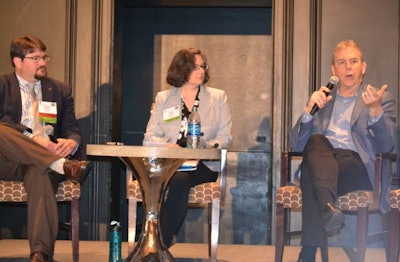
Consumers of meat and poultry are naturally skeptical about their food, and to counter that skepticism, grocery chains, restaurants and foodservice companies want to have more communication with the farmers who produce that food.
That sentiment was agreed upon by three panelists taking part in the session, “Bringing the Food Chain to the Table: Retailer/Restaurant/Foodservice Perspectives,” held May 8 at the 2019 Animal Agriculture Alliance Stakeholders Summit in Kansas City, Missouri.
Mark Smith, chief procurement officer, Centralized Supply Chain Services, works with IHOP and Applebee’s on their food purchases and setting supply chain policies. He says whether it is deserved or not, larger companies do not always have credibility when it comes to matters such as animal welfare, environmental consciousness, or sustainability. But he believes consumers do trust the farmers.
“We’ve got to be able to tell our story, and tell our story in a credible fashion,” Smith said.
David Guilhaus, senior manager of food safety, Publix; and Judy Panayos, senior director of sustainability and supply management, Sodexo, both said they hear more from non-governmental organizations (NGOs) more than they do from farmers. More input from farmers will help get an accurate message out, Guilhaus said.
He said people look to Publix as the face of their food, so they want to make sure that food is raised according to their values. Input from producers can help them get that message.
“We are the face of the brand, the face of the customer,” said Guilhaus. “But ultimately, the care of the animal is in your hands, so if you can help us with that story and how we can communicate that, craft that and share that with the customers – our customers as well as yours – that helps us kind of set the tone for where the conversation goes, rather than letting other groups set the tone of the conversation for us.”
Panayos added that relations with farmers can also help clear up possible misconceptions about animal welfare and other issues that lead to consumer skepticism.
“They trust the brands, but also when they hear stories or see stories or understand the farm where it comes from, that can be very, very powerful. And that can be local producers or that can be large farms with people at the end of it. People connecting with people, that can be very important,” she said.
“From my perspective, that can help us deal with some of these maybe controversial challenges that we have if we can really connect people with their food and the people who are producing it.”
















